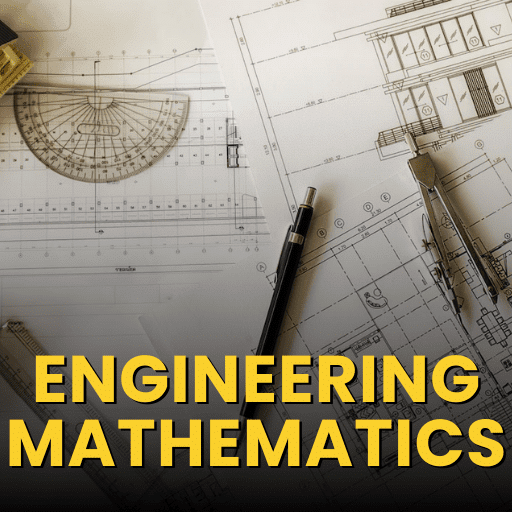Best Study Material for Engineering Mathematics Exam
Engineering Mathematics Exam > Engineering Mathematics Notes > Lecture 2 - Order Degree and Formation of Differential Equations
Lecture 2 - Order Degree and Formation of Differential Equations - Engineering Mathematics PDF Download
| Download, print and study this document offline |
Please wait while the PDF view is loading
Page 1
Order, Degree and Formation Of Differential Equations
Institute of Lifelong Learning, University of Delhi pg.1
Paper: Ordinary Differential Equations
Lesson: Order, Degree and Formation of Differential
Equations
Lesson Developer: Kapil Kumar
College/Department: Assistant Professor, Department of
Mathematics, A.R.S.D. College, University of Delhi
Page 2
Order, Degree and Formation Of Differential Equations
Institute of Lifelong Learning, University of Delhi pg.1
Paper: Ordinary Differential Equations
Lesson: Order, Degree and Formation of Differential
Equations
Lesson Developer: Kapil Kumar
College/Department: Assistant Professor, Department of
Mathematics, A.R.S.D. College, University of Delhi
Order, Degree and Formation Of Differential Equations
Institute of Lifelong Learning, University of Delhi pg.2
Table of Contents
Chapter: Order, Degree and Formation of Differential Equations
? 1: Learning Outcomes
? 2: Introduction
? 3: Order Of a Differential Equation
? 4: Degree Of a Differential Equation
? 5: Linear and Non-linear Differential Equations
? 6: Ordinary and Partial Differential Equations
? 7: Solution of Differential Equations
o 7.1: General Solution or Complete Primitive
o 7.2: Particular Solution
o 7.3: Singular Solution
? 8: Formation of Differential Equations
? Exercises
? Summary
? Reference
Page 3
Order, Degree and Formation Of Differential Equations
Institute of Lifelong Learning, University of Delhi pg.1
Paper: Ordinary Differential Equations
Lesson: Order, Degree and Formation of Differential
Equations
Lesson Developer: Kapil Kumar
College/Department: Assistant Professor, Department of
Mathematics, A.R.S.D. College, University of Delhi
Order, Degree and Formation Of Differential Equations
Institute of Lifelong Learning, University of Delhi pg.2
Table of Contents
Chapter: Order, Degree and Formation of Differential Equations
? 1: Learning Outcomes
? 2: Introduction
? 3: Order Of a Differential Equation
? 4: Degree Of a Differential Equation
? 5: Linear and Non-linear Differential Equations
? 6: Ordinary and Partial Differential Equations
? 7: Solution of Differential Equations
o 7.1: General Solution or Complete Primitive
o 7.2: Particular Solution
o 7.3: Singular Solution
? 8: Formation of Differential Equations
? Exercises
? Summary
? Reference
Order, Degree and Formation Of Differential Equations
Institute of Lifelong Learning, University of Delhi pg.3
1. Learning outcomes:
After studying this chapter you should be able to understand the
? Order Of a Differential Equation
? Degree Of a Differential Equation
? Linear and Non-linear Differential Equations
? Ordinary and Partial Differential Equations
? Solution of Differential Equations
? General Solution or Complete Primitive
? Particular Solution
? Singular Solution
? Formation of Differential Equations
Page 4
Order, Degree and Formation Of Differential Equations
Institute of Lifelong Learning, University of Delhi pg.1
Paper: Ordinary Differential Equations
Lesson: Order, Degree and Formation of Differential
Equations
Lesson Developer: Kapil Kumar
College/Department: Assistant Professor, Department of
Mathematics, A.R.S.D. College, University of Delhi
Order, Degree and Formation Of Differential Equations
Institute of Lifelong Learning, University of Delhi pg.2
Table of Contents
Chapter: Order, Degree and Formation of Differential Equations
? 1: Learning Outcomes
? 2: Introduction
? 3: Order Of a Differential Equation
? 4: Degree Of a Differential Equation
? 5: Linear and Non-linear Differential Equations
? 6: Ordinary and Partial Differential Equations
? 7: Solution of Differential Equations
o 7.1: General Solution or Complete Primitive
o 7.2: Particular Solution
o 7.3: Singular Solution
? 8: Formation of Differential Equations
? Exercises
? Summary
? Reference
Order, Degree and Formation Of Differential Equations
Institute of Lifelong Learning, University of Delhi pg.3
1. Learning outcomes:
After studying this chapter you should be able to understand the
? Order Of a Differential Equation
? Degree Of a Differential Equation
? Linear and Non-linear Differential Equations
? Ordinary and Partial Differential Equations
? Solution of Differential Equations
? General Solution or Complete Primitive
? Particular Solution
? Singular Solution
? Formation of Differential Equations
Order, Degree and Formation Of Differential Equations
Institute of Lifelong Learning, University of Delhi pg.4
2. Introduction:
An Equation involving derivatives or differentials of one or more dependent
variables with respect to one or more independent variables is called differential
equations. In this lesson, we will study order and degree of differential equation, three
types of solutions i.e. general, particular and singular solution and also learn how to
form differential equations.
Page 5
Order, Degree and Formation Of Differential Equations
Institute of Lifelong Learning, University of Delhi pg.1
Paper: Ordinary Differential Equations
Lesson: Order, Degree and Formation of Differential
Equations
Lesson Developer: Kapil Kumar
College/Department: Assistant Professor, Department of
Mathematics, A.R.S.D. College, University of Delhi
Order, Degree and Formation Of Differential Equations
Institute of Lifelong Learning, University of Delhi pg.2
Table of Contents
Chapter: Order, Degree and Formation of Differential Equations
? 1: Learning Outcomes
? 2: Introduction
? 3: Order Of a Differential Equation
? 4: Degree Of a Differential Equation
? 5: Linear and Non-linear Differential Equations
? 6: Ordinary and Partial Differential Equations
? 7: Solution of Differential Equations
o 7.1: General Solution or Complete Primitive
o 7.2: Particular Solution
o 7.3: Singular Solution
? 8: Formation of Differential Equations
? Exercises
? Summary
? Reference
Order, Degree and Formation Of Differential Equations
Institute of Lifelong Learning, University of Delhi pg.3
1. Learning outcomes:
After studying this chapter you should be able to understand the
? Order Of a Differential Equation
? Degree Of a Differential Equation
? Linear and Non-linear Differential Equations
? Ordinary and Partial Differential Equations
? Solution of Differential Equations
? General Solution or Complete Primitive
? Particular Solution
? Singular Solution
? Formation of Differential Equations
Order, Degree and Formation Of Differential Equations
Institute of Lifelong Learning, University of Delhi pg.4
2. Introduction:
An Equation involving derivatives or differentials of one or more dependent
variables with respect to one or more independent variables is called differential
equations. In this lesson, we will study order and degree of differential equation, three
types of solutions i.e. general, particular and singular solution and also learn how to
form differential equations.
Order, Degree and Formation Of Differential Equations
Institute of Lifelong Learning, University of Delhi pg.5
3. Order of a Differential Equation:
The order of the highest order derivative involved in a differential equation is called
the order of the differential equation.
Example 1:
Find the order of the following differential equations.
(i)
3
2
2
dy
dx
??
??
??
+ x
5
dy
dx
??
??
??
+ y=
2
x
(ii)
y=
x
dy
dx
??
??
??
+ k/(
/ dy dx
)
Solution: (i) It is of the second order because the order of the highest derivative is 2.
(ii) It is of the first order because the order of the highest derivative is 1.
Read More
FAQs on Lecture 2 - Order Degree and Formation of Differential Equations - Engineering Mathematics
| 1. What is the order of a differential equation? |  |
| 2. How is the degree of a differential equation determined? |  |
Ans. The degree of a differential equation is determined by the power to which the highest order derivative is raised, after the equation has been simplified by eliminating any fractional or negative exponents.
| 3. What is the formation process of a differential equation? |  |
Ans. The formation process of a differential equation involves expressing a given physical or mathematical problem in terms of an unknown function and its derivatives. This is done by relating the rate of change of the function to the variables and parameters involved in the problem, leading to the formation of a differential equation.
| 4. How can differential equations be used in engineering mathematics? |  |
Ans. Differential equations play a crucial role in engineering mathematics as they are used to model and analyze various physical phenomena and systems. They help in describing the relationship between rates of change and variables in engineering problems, enabling engineers to predict and control the behavior of systems.
| 5. Can differential equations be solved analytically? |  |
Ans. Yes, some differential equations can be solved analytically, meaning that a closed-form expression for the solution can be obtained. However, not all differential equations have analytical solutions, especially those of higher order or with complex nonlinearities. In such cases, numerical methods or approximations are often used to obtain approximate solutions.
Related Searches






























